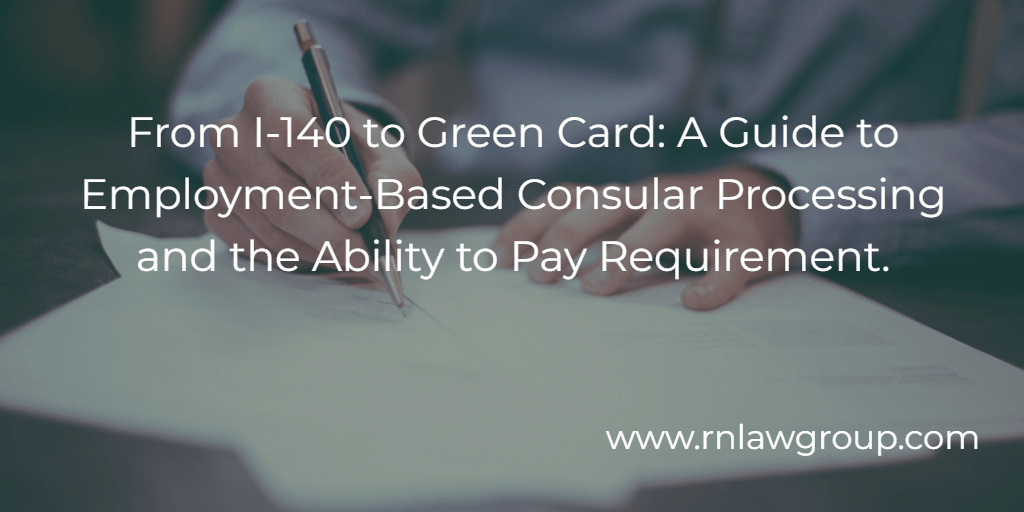
From I-140 to Green Card: A Guide to Employment-Based Consular Processing and the Ability to Pay Requirement.
When seeking to sponsor a beneficiary for the employment-based green card process when they are abroad and not working for the company can be a complex process. The employer will want to carefully consider various factors, including the ability to pay requirement, and the employer should know what to expect and the steps required for consular processing.
Some factors the employer would want to consider prior to beginning the employment-based green card process while the beneficiary is abroad are: the job offer, the prevailing wage, the labor certification, and the timing of the entire process.
Job Offer
The sponsoring company must have a valid job offer for the beneficiary that is consistent with their qualifications and experience. If the beneficiary is not currently working for the company, the job offer must be made contingent on the approval of their green card application.
Prevailing Wage
The sponsoring company must offer the beneficiary a salary that is at least equal to the prevailing wage for the position in the geographic area where they will be employed. The USCIS may question whether the company has the ability to pay the offered wage if the beneficiary is not currently generating income for the company. Additional information on how the company may provide evidence of their ability to pay is discussed further below.
Labor certification
Depending on the employment-based category, the sponsoring company may need to obtain a labor certification from the Department of Labor before proceeding with the next stages of the green card process. This process can be time-consuming and will require the company to demonstrate that there are no willing, able, or qualified U.S. workers available for the position.
Timing
The employment-based green card process can be a lengthy process to complete. The sponsoring company should be prepared to commit to sponsoring the beneficiary for an extended period of time.
When sponsoring a beneficiary for an employment-based green card, the sponsoring company must be able to demonstrate its ability to pay the offered wage. The ability to pay requirement is intended to ensure that the company has the financial resources to support the beneficiary’s employment and wage. If the beneficiary is not currently working for the company, then the USCIS may question whether the company has the ability to pay the offered wage if the beneficiary is not currently generating income for the company. However, if the company can provide evidence of its financial standing and ability to support the beneficiary’s future employment, it may still be able to meet the requirement. Some of the ways that the company may demonstrate its ability to pay include: submitting financial statements, providing evidence of financial stability, demonstrating a history of paying similar wages.
It is important to note that the ability to pay requirement is an ongoing requirement that may be reviewed at any point while sponsoring the beneficiary for their green card. Therefore, the sponsoring company should be prepared to demonstrate its financial resources and ability to pay throughout the entire process.
With these considerations in mind, including the ability to pay requirement, it is important for the employer to know the steps for the Employment-based consular processing of the green card. Since the beneficiary is abroad, they will apply for their green card at a U.S. consulate or embassy. For the categories which require a labor certification, the beneficiary would need to wait for the approval of the labor certification before commencing with the following steps:
Step 1 – File the I-140 petition:
The first step in the employment-based consular processing is for the employer to file an I-140 petition on behalf of the sponsored beneficiary with the USCIS. This petition must be approved before you can proceed with consular processing. The USCIS will send the approved petition to the Department of State’s National Visa Center.
Step 2 – File the DS-260:
Once the I-140 petition is approved, the beneficiary must complete and submit the DS-260, Online Immigrant Visa Application, to the Department of State’s National Visa Center (NVC). The petition will remain with the NVC until an immigrant visa number is available.
Step 3- Pay fees:
All the required fees must be paid.
Step 4 – Submit documents:
Next, all the required documents must be submitted to the NVC, including a copy of the I-140 approval notice, a copy of the DS-260 confirmation page, passport biographic page, police clearance certificates, and other documents as required.
Step 5 – Attend an interview:
Once the NVC reviews the documents and determines that the beneficiary is eligible for an employment-based visa, the case is forwarded to the U.S. consulate or embassy abroad. The beneficiary will be scheduled for an interview with a consular officer to determine their eligibility for the visa.
Step 6 – Receive the visa:
If the consular officer approves the visa application, the beneficiary will receive their visa and a packet of information to present to the immigration officer at the port of entry in the U.S. Before departing to the U.S., the beneficiary will need to pay the USCIS Immigrant Fee to process the immigrant visa packet and to produce the green card. When arriving to the U.S., the CBP officer at the port of entry will determine whether to admit the beneficiary into the U.S.
It is important to note that the employment-based consular processing may vary depending on the specific employment-based category and the U.S. consulate or embassy where the beneficiary applies.
Overall, sponsoring a beneficiary for the employment-based green card process when they are abroad and not working for the company requires careful consideration of several factors, including the ability to pay requirement, and the employer should know the what to expect and the steps required for consular processing.
If you seek assistance with your green card process, please schedule a consultation with one of our experienced immigration attorneys.
Reddy & Neumann has been serving the business community for over 26 years and is Houston’s largest immigration law firm focused solely on U.S. Employment-based immigration. We work with both employers and their employees, helping them navigate the immigration process quickly and cost-effectively.
By: Ruth Garbanzo
Ruth Garbanzo assists clients in the beginning stages of their green card process in the Perm Labor Certification Department as well as the final stages of their green card process in the Adjustment of Status Department. Throughout our client’s green card journey, Ruth strives to provide diligent service to each client from start to finish.

